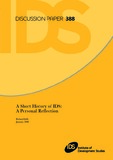| dc.contributor.author | Jolly, Richard | |
| dc.date.accessioned | 2018-07-03T08:27:29Z | |
| dc.date.available | 2018-07-03T08:27:29Z | |
| dc.date.issued | 2008-01-28 | |
| dc.identifier.citation | Jolly, R. (2008) A Short History of IDS: A Personal Reflection, IDS Discussion Paper 388, Brighton: IDS | en |
| dc.identifier.isbn | 1 85864 673 1 | |
| dc.identifier.uri | https://opendocs.ids.ac.uk/opendocs/handle/20.500.12413/13847 | |
| dc.description.abstract | IDS was founded in 1966 as a 'special institution', Britain's first national institute of development studies. This history, prepared for the 40th anniversary, traces the evolving story from the founding vision and leadership, especially of the first Director Dudley Seers, the early programmes of research and short term training courses, the establishment of the first Mphil course in 1973 and the threats to IDS's existence when the institute was classed as a Qango (a Quasi non-government organisation) under the Thatcher Government in 1979.
With strong support from within Britain as well as from abroad, IDS survived and over the years has maintained an impressive national and international record of pioneering work in research, teaching and, since the 1990s, in communications and outreach. After a shaky financial few years which followed the loss of all core funding from government in the 1990s, the institute?s basic programmes of research and teaching have grown in both quantity and quality.
The history identifies 12 areas where IDS has made pioneering intellectual contributions: its early work on the meaning of development; employment strategy and redistribution with growth; village studies; participatory approaches and the perspectives of poor people on development; women and gender as integral to development; national development in the context of unequal international relations; science and technology and transnational corporations; development thinking applied to developed countries; alternatives to structural adjustment and debt relief; broader concepts of governance and democracy; an ethos of walking the talk; and over the whole period, multi-disciplinary approaches which question development orthodoxy.
Since the 1990s, IDS has strengthened its national and international outreach with a wide range of approaches and initiatives to communication and knowledge sharing.
The history proceeds in four parts: the main chronological account which sets evolving ideas in research and teaching in the context of changing development issues and policy preoccupations; milestones in IDS's major intellectual contributions; a 40th anniversary balance sheet of the institute's successes, failures and omissions; and a brief final word on the future. | en |
| dc.language.iso | en | en |
| dc.publisher | Institute of Development Studies | en |
| dc.relation.ispartofseries | IDS Discussion Paper;388 | |
| dc.rights | This publication is copyright, but may be reproduced by any method without fee for teaching or non-profit
purposes, but not for resale. Formal permission is required for all such uses, but normally will be granted
immediately. For copying in any other circumstances, or for re-use in other publications, or for translation or
adaptation, prior written permission must be obtained from the publisher and a fee may be payable. | en |
| dc.rights.uri | http://www.ids.ac.uk/files/dmfile/IDSOpenDocsStandardTermsOfUse.pdf | en |
| dc.subject | Aid | en |
| dc.title | A Short History of IDS: A Personal Reflection | en |
| dc.type | IDS Discussion Paper | en |
| dc.rights.holder | Institute of Development Studies | en |
| dc.identifier.team | Directorate and Development Office | en |
| dcterms.dateAccepted | 2008-01-28 | |
| rioxxterms.funder | Default funder | en |
| rioxxterms.identifier.project | Default project | en |
| rioxxterms.version | VoR | en |
| rioxxterms.funder.project | 9ce4e4dc-26e9-4d78-96e9-15e4dcac0642 | en |

